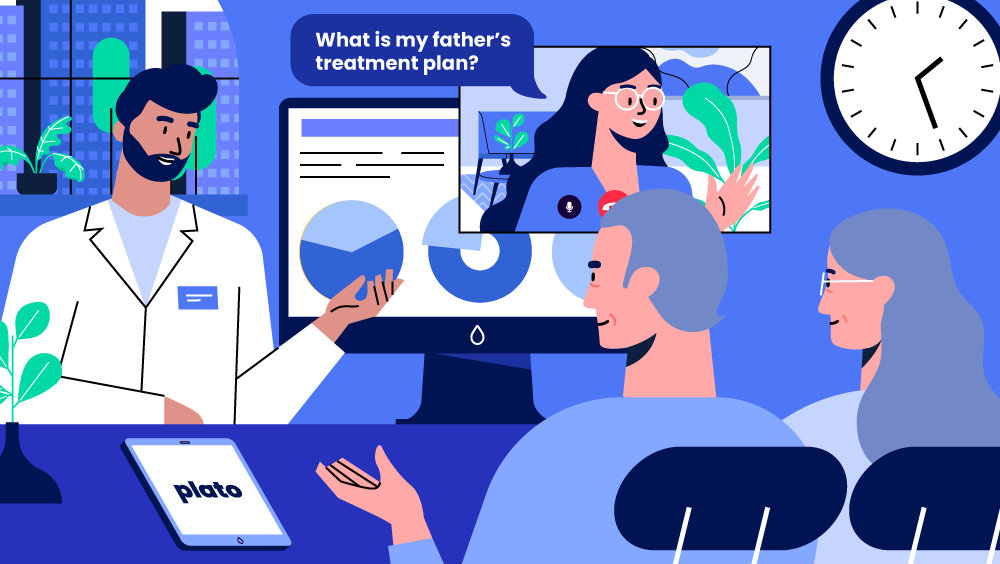Blog With Stricter COVID-19 Precautions, Patients and Caregivers are Welcoming the Benefits of Virtual Care

Tighter visitor/caregiver restrictions at clinics are pushing the benefits of teleconsultation services, such as PlatoConnect, to the forefront.
COVID-19 has impacted operations across nearly every industry. For healthcare, stricter safety precautions that include limitations to the number of visitors/caregivers allowed in clinics are affecting patients.
Aside from taking visitors’ temperatures and having them complete declaration forms about current health status, latest travel history and recent contact with COVID-19 patients, some hospitals have begun implementing tighter restrictions on the number of people allowed into each room for wards and clinics. For instance, Ng Teng Fong General Hospital and Sengkang General Hospital have updated their visitor policies, such that only one visitor/caregiver is allowed per patient inside its specialist clinics.
Impact on Patients and their Families
For younger patients who require little or no caregiver assistance, this restriction might pose less of a concern. For elderly patients, however, limitations such as these can cause added inconvenience and stress.
In the case of 75-year-old retiree Mr Lee*, physically travelling down to his urologist is already a feat due to mobility issues. He is accompanied by his 65-year-old wife for appointments, but tighter safety precautions means his employed children cannot be physically present during the specialist consultation, even if they take leave from work.
Mr Lee’s medical case is a complex one that focuses on several organs, and his family finds that having at least one of his children present in addition to his wife during the consultation, will greatly ease the family’s concerns about his medical condition.
“Even though my sister was able to accompany my parents to the hospital for my dad’s recent appointment with the urologist, she was denied entry since only one caregiver can escort my dad into the specialist’s consultation room due to the COVID-19 safety precautions,” explains Mr Lee’s 30-year-old daughter, Ms Lee*, who prefers not to be named.
“Since my sister didn’t join the consultation physically or virtually, my mum was the only other person present during the doctor’s visit. This was an important consultation because my dad was receiving his results from a medical test that would determine how life threatening his condition is.”
“Later that day, when I asked my mum how the consultation went and for updates about the diagnosis plus treatment, I had many questions about the information that she had relayed. She could not provide answers to my questions. Furthermore, my mum admitted that there were questions she had forgotten to ask the doctor during the consultation. At this point, I felt it was important that someone else, either one of my siblings or I, be present in the next consultation, in addition to my mum.”
“My mum is getting on in years, so I would very much prefer if either one of my siblings or I can join in during the consultation as well, even if it’s over a video call, as my dad’s case is not a straightforward one and involves multiple organs.”
“I understand that my dad would want my mum present for comfort, but realistically, two heads are better than one—my siblings and I are likely to ask vital questions that my mum might not have thought of during the consultation. It would not only be more efficient, but also more comforting and definitely more reassuring if my siblings and I heard the news directly from the doctor.”
“Miscommunication can occur as information gets diluted when it is passed down from one person to the next. I have asked my mum to request that the doctor let me join the next consultation through a video call. It would be great if the doctor or clinic could set this up, because my parents are not tech-savvy and holding up a mobile phone to use Whatsapp video throughout the entire session is tiring.”
How Doctors/Clinics can Instantly Help with PlatoConnect
For doctors and clinics that use Plato, virtual visits are available at the click of a button with PlatoConnect, a secure teleconsultation service that provides fast, uninterrupted communication between a doctor’s device and that of their patient.
Instead of waiting for your patients to request for a video call option, Plato’s doctors and clinics can easily offer this option when scheduling their appointments.
Ask your patient or their caregiver if they would like to use PlatoConnect during their upcoming consultation, so their loved one(s) can join in the consultation remotely.
For patients who choose PlatoConnect, your nurse or clinic assistant will email a PlatoConnect invite to their caregiver, so he or she can simply click on the link provided in the email to teleconsult at the appointment time.
In the case of Ms Lee, she can click on the PlatoConnect link inside the email at the time of her dad’s next appointment and join the consultation, no matter where she may be. Mr and Mrs Lee* need not worry about the video call as the clinic will take care of the teleconsultation connection for them. Doctors can conduct the video call through their browser (recommended) or a mounted camera for hands-free convenience.
“This service is useful for elderly patients who may not be able to articulate medical issues or matters so accurately to family members that are interested to know the details,” explains Mrs Lee after being introduced to the option of PlatoConnect. “It will be a great avenue for family members to interact directly with the doctor during the consultation, even though they can’t be physically present. It is much more convenient and practical during such a time as this, especially with concerns surrounding COVID-19.”
Learn how you can help your patients and their families using PlatoConnect, meet for a demo.
*Names have been changed to protect the privacy of the patient and family members.
– Wong Yoon Sann
March 31, 2020
